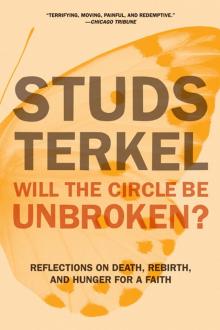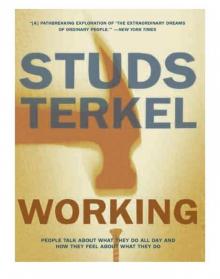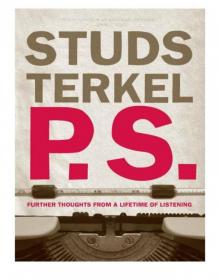- Home
- Studs Terkel
P.S. Page 10
P.S. Read online
Page 10
EACH OF US—depending on luck, circumstance, or a rainy day—may encounter a work that reveals and exhilarates. For fortunates passing through Chicago, it is Hopper’s Nighthawks, quietly exploding on the south wall of the Art Institute. The scissor-faced customer, his seared companion, and the boneweary counterman hold you; the slightly hunched back of the loner, whose face evades you, haunts you forever. Yet, that alone isn’t what Hopper is about. It is the light that is the hero. Or is it the darkness of the street outside? One is artificial, the other natural; both are given equal weight. As Alexander Eliot observed, “The dark is less lonely.” Here are all the open allnite beaneries you have ever experienced. Here is everyman’s lonesome valley.
You are offered one man’s vision of America, with his profound attachment to the familiar: the city, the town, the countryside (no idyllic landscapes here, the rural past being overwhelmed by the industrial present, the captured moment of change). And it is all luminous. His was the singular American light as distinguished from, say, the Parisian light he had discovered in earlier days.
Whether it be Room in New York or Hotel by a Railroad or Sunlight in a Cafeteria or Office at Night or those old houses, the aloneness is deepened by the light. Remote from the person, it would appear—his men and women being so often in shadow and featureless—and concerned with the environment, Hopper overwhelms with a feeling for both. As his persons, in the light, sun or electric, turn away one from another, he is telling us of alienation without uttering a syllable.
The cold of the city was touched by Hopper as by no American painter, before or since. The woman, nude or half-dressed, usually near the window, was his most intimate human.
Hopper once said that truth in art is what’s truly modern, so that “Giotto [could be] as modern as Cézanne.” It certainly makes Hopper infinitely more contemporary than any Now darling you can name. Renewed wonder and humility—the artist’s own phrases—are what he’s all about.
On one occasion, he cited Emerson, regarding an earlier painter: “In every work of genius, we recognize our own rejected thoughts; they come back to us with a certain alienated majesty.” That goes for Hopper. And all he ever wanted to do was to paint sunlight on the side of a house.
A CHRISTMAS MEMORY, 1973
WAS IT THE CHRISTMAS SEASON OF 1933 I best remember? I had reached my majority. It was a blessed year for other reasons. The Volstead Act had been repealed. Bootlegging was out. Pimping was in. Alphonse Capone, our city’s most distinguished entrepreneur, aside from Sam Insull, had switched from the craft of alkie running to the fine and lively art of Pandarus. His was among the first conglomerates of the flesh. The Lexington, the Winchmere, and God knows how many cribs in Cicero had become a home away from home for the girl from Bloomington, Cedar Rapids, and Fond du Lac.
Small-town madonnas were, by some grotesque alchemy, transmuted into big-town magdalenes. Quicker than a trembling, pimply faced boy could hand over a two-dollar bill. Eros was getting a bad name. Yet, on that Christmas Eve, Virtue triumphed. And the God of Love smiled benignly.
At the time, the Swede from Galesburg was chanting plaintively:Nobody knows now where Chick Lorimer went
Nobody knows why she packed her trunk . . . a few old things
And is gone.
Gone with her little chin
Thrust ahead of her
Nobody knows where she’s gone.
I know. I found out on that Christmas Eve of ’33. She was a guest at my mother’s hotel. Herod led her up the golden staircase. He was otherwise known as Nick Stassiosous, proprietor of Victoria No. 2, the all-night beanery. He laid five dollars across the desk and said the girl was his niece from Terre Haute. A music student, he furthered informed us. As I stared at “her soft hair blowing careless / From under a wide hat,” he took the key and shut the door behind them. I had no idea he was a music teacher. Were they carols I was hearing? The bells of paradise, perhaps? My Adam’s apple was bobbing wildly, as though some piece of forbidden fruit was forever stuck in my throat.
And where was John the Baptist on this holy night? He was in the lobby, holding forth, roaring, “Woe unto them who call evil good and good evil; who put darkness for light, and light for darkness; who put bitter for sweet, and sweet for bitter. Isaiah 5:20.” He reached a crescendo: “Prepare, all ye sinners, prepare!” This one was otherwise known as Steve Chch, the Croatian pearl diver.3 Not only was he penniless; he didn’t have a vowel to his name. He was rich, though, in portents and warnings, shouting out hellfire sermons, Gideon Bible held chest high. There was room at our inn for everybody. Ours were the winking Gospels.
John the Baptist was forever prophesying the world’s end. Yet, his appearance was not that of your everyday nutty sidewalk Jeremiah. No glittering eye of the Ancient Mariner here. (Though he did once work in the galley of a Greek ocean liner and was fired for flinging a dish of moussaka at Aristotle Onassis’s uncle; such was the nature of his religious fervor.) No long black coat or long gray beard. His were the baggy pants of a burlesque comic and glasses thicker than George Zucco’s. (This last, you remember, was movies’ mad scientist.) The fact is he was as cockeyed as Ben Turpin and as myopic as a mole.
Regularly, his fever high, he posted special delivery letters to Franklin D. Roosevelt, Mahatma Gandhi, Albert Einstein, Benito Mussolini, and Babe Ruth (who, he figured, also had clout). As well as to Ramsay MacDonald, Britain’s prime minister. As well as to Alphonse Capone, who sponsored the biggest breadline in town. (Al, the Good Samaritan, was often applauded by the multitudes as he and his Roman battalion took their box seats at Cubs Park.) For good measure, he sent equally urgent communiqués to Herbert Hoover, Henry Ford, and David Lloyd George. He was aware that Pontius Pilate was dead; no letter for him. I am certain his earnings as a pearl diver (five bucks a week plus free blue-plate specials) went in large part toward the purchase of stamps. They were impressively thick envelopes. We were, all of us, in awe.
As fate would have it, John the Baptist was sweating his life away in the kitchen of Victoria No. 2. Nick Stassiosous was his boss; a singularly abusive and exploitive one.
John the Baptist and I had tasted little of life’s forbidden, and thus delightful, fruits. He neither drank nor smoked nor, the other guests were certain, had ever known a woman. I had touched nothing stronger than Dr Pepper. Within one hour, during this remarkable Eve (Eve?), our two lives were considerably altered.
As Herod and his niece from Terre Haute were engaged in a music lesson upstairs, the chimes from the Tribune Tower sounded “God Rest Ye, Merry Gentlemen,” “Adeste Fidelis,” “Good King Wenceslas,” and “Go Tell It on the Mountain.” Though the effect on the pinochle players in the lobby was somewhat euphoric, their thirst was unslaked. Some son of a bitch had killed the last pint. They were still cold, cold sober. Distemper was in the air. Sprague, the journeyman carpenter, and Ed Duerr, the railroad fireman, were passing words. While the Prince of Peace was a-borning. Some celebration. Go tell it on whose mountain?
Enter Prince Arthur Quinn, holding high a fifth of Chapin & Gore. Placing the treasure carefully on the table, he proclaimed, “Merry Christmas, boys.” It was now official. Prince Arthur, son of Hot Stove Jimmy Quinn, was our precinct captain. It was his annual show of appreciation. Aside from Election Day, when Chapin & Gore had the persuasive powers of ward committeemen. Though our guests numbered fifty, they counted for one hundred at the polling place.
Beatifically, he smiled my way. I was, this year, eligible to vote. Poor old Cermak was gone by way of a goofy assassin’s bullet and ever remembered for his martyred mumble to FDR, “I’m glad it was me instead of you.” (Though his English teacher would have flunked him, he is immortal and she is dust.) Anyway, there was still an X or two or three to be marked beside the Gaelic names of Big Ed Kelly, Dorsey Crowe, and Botchie Connors.
The smell of sour mash pervaded the lobby and all spirits were buoyed. All except one: John the Baptist. He cried Damnation and predicted Apocalypse. �
�Woe unto them who are mighty and drink wine; and men of strength to mix strong drink.” (On occasion, he was suspected of being in league with Mrs. Tooze of the WCTU.) Prince Arthur Quinn, his fedora a Kelly green and his face a beet red, grumbled, “Who da fuck is dis nut? T’row ’im out.” The other guests merely smiled. There were times past when they seriously discussed throwing him out the window. It was only a two-story drop. But propinquity has its way. Though, in the beginning, they had come to jeer, they remained, if not to pray, at least to nod and murmur, “Amen.”
The bottle was passed around. Eventually, it came my way. I hesitated. The men chuckled softly, nodding encouragement. All except John the Baptist. He howled. “No, boy. As the fire devoureth the stubble and the flame consumeth the chaff, so this root shall be as rottenness and their blossom shall go up as dust because they have cast away the law of the Lord of Hosts. Isaiah 5:24.” The words poured forth torrentially. Though I was uncertain as to their meaning, I had a hunch they bode no good.
Prince Arthur was indignant. “Dis guy’s a fuckin’ fanatic. I’ll nail ’im to a cross. Scarin’ da kid dat way.” To me, Prince Arthur beamed. “Go ahead, kid; drink up. It’ll put hair on your chest.” Really, I wasn’t that glabrous. As I studied the label on the bottle, I knew a moment of decision was at hand. John the Baptist was jabbing at the air, Gideon Bible held tight in his fist. Prince Arthur was moaning, “Will ya take a drink fer Chrissake!” That did it. For Christ’s sake. Never had I heard the Savior’s name invoked so appropriately. On such a night as this, the God of Bliss, et cetera and et cetera.
I put the bottle to my lips. “No-o-o-o!” The wail of the pearl diver was stifled by the command of the precinct captain. “Shut up, you dirty Bolshevik!” I swallowed. My throat was on fire. I coughed. Spittle came. So did tears. I took a deep breath and once more I swallowed. Was my tongue blistered by the devil’s brew as I passed the bottle to the next one? I had turned away from John the Baptist. Prince Arthur chortled. “’Atta kid. Dere goes yer cherry. Stick wit’ me, kid, and I’ll take ya to da Winch or da Lex. Or even Cicero. Real poontang, kid. You’ll be a man before yer mudder.” In the eyes of John the Baptist, I saw a thousand hells.
I followed his look. At the door were two of them: Herod and Chick Lorimer. “Artie! What da hell are ya doin’ here?” The restaurateur was in an ebullient mood. “Steve, fer Chrissake!” The precinct captain was of equally blithe spirit now. A kindred soul at last. He whistled softly through his teeth as he observed the girl. “Hey, ya doin’ aw right fer a Greek, huh? Huh?” A long drawn out, “Yeah-h-h.” Herod touched the girl’s sleeve. “Oh, yeahhh. She’s a good friend o’ mine.” Turning to her: “What’s yer name again, baby?” Chick Lorimer stared at the lobby’s linoleum. Again, my Adam’s apple was misbehaving. And a sense of some vague humiliation I couldn’t get a fix on.
In the exuberance of the exchange, neither of them noticed John the Baptist. In his eyes I now saw a million hells. “Pi-i-mp!” It was a howl. No, it was more a cry of the banshee wholly at discord with the nearby chimes’ “Silent Night.”
“Wha-a-a-a?” Herod stared, mouth agape.
“You pimp! You bully! You fat, no-good Babylonian! Woe unto them who call evil good and good evil; who put darkness for light, and light for darkness; who put bitter for sweet, and sweet for bitter. Isaiah 5:20.” God, did Isaiah say all that? John the Baptist, it appeared, really had a fix on this one.
Prince Arthur took a step away, toward Herod. “Dis guy’s a real loony. Could be dangerous.”
Herod extended his thumb in the direction of his tormentor. “He’s my goddam dishwasher! Da crazy Serbian!”
“I’m Croatian, you fool! You ignorant Macedonian! Do you write to Mahatma Gandhi? No! Do you write to President Roosevelt? No! To Albert Einstein. Henry Ford? No, you do not! Do you know the Holy Bible?” He thumped at the book. “No! You know nothing. Pimp! Pimp! Pimp!”
Herod, recovering his composure, held forth his pinky, the diamond of its ring shimmering in the light. “Yer fired! Did ya hear what I said? Fired! Come in my restaurant, I’ll t’row you out on yer ass! Yer t’rough!”
“And you’re damned!”
It happened so suddenly. The Gideon Bible was hurled across the lobby. It struck Nick Stassiosous below his right eye. A direct hit. His hands flew to his face. “I’m blinded!” A long agonizing wail. “Da bastard blinded me!”
Chick Lorimer casually drew his hands away from his face. She hardly glanced at him. An angry red welt, with intimations of blue-black, was quickly puffing up. “You’ll have a beaut of a shiner is all. You’ll live.” “It ain’t yer eye, ya whore! Jeez, it hurts. I need a doctor!” With a whimper, he turned and hurried down the golden staircase.
Prince Arthur Quinn was edging toward the doorway. He cast a wary glance at the lunatic. This was a serious matter. The green fedora disappeared as a faint murmur was heard: “I’m gettin’ da cops. Dis guy’s dangerous.”
John the Baptist was transfixed. A mist formed on his glasses. Mist or no mist, cockeyed or myopic, he saw Chick Lorimer. He saw her stoop down and pick up the book. She walked across the lobby and handed it to him. She grinned. “Good throw. Cubs could use you.” John the Baptist was mute. She laughed lightly. Again, I had trouble with my Adam’s apple. She was straightening out the collar of his torn jacket. “Know the Book of Luke?” He nodded. “Cat got your tongue?” He shook his head. “Okay, then you can read me the story of Mary and Joseph and no room at the inn and all that, right?” He nodded. She took him by the hand and led him out of the lobby.
At the doorway, she turned toward me. “Sonny.” Sonny! Christ almighty, she was no more than nineteen herself. Sonny! Damn! Damn! Damn! Damn! “The Greek ran off with the key. You got a skeleton, ain’tcha?” I nodded. A lot of good that nod did me.
John the Baptist was at the window of her room, feverishly leafing through the book. Muttering to himself: “Woe is me, for I am undone, because I am a man of unclean lips; for mine eyes have seen the King, the Lord of hosts.” He didn’t seem too unhappy about it, though. At the door, she asked softly, “How far to Cicero?” I told her. The door clicked shut. In the lobby, I joined the others. There were still several ounces of Chapin & Gore left in the bottle. This time, it went down easier. While the journey to Bethlehem was being recounted upstairs, the Trib Tower chimes were sounding. “Hark! The Herald Angels Sing.”
UPTOWN
Uptown attracted us. In 1977 my wife and I moved here. At the time, it was a way station for many lost Appalachians and Ozarkians, for the mountain people. Today SUVs occupy the space of three Appalachian owned flivvers. Today it is gentrified compared to what it once was, years ago. At that time, Native Americans hid in doorways with muscatel in paper bags, and the mountain people looked for voices. During my first day there, I wandered toward the bus, past a schoolyard full of little kids, black, Asian, white, all nationalities, first-, second-, and third-world.
Suffer the Little Children, 1980
THE FOOL’S PARADISE was a schoolyard in Uptown.
The Fool’s a fool any way you look at it. Consider the manner in which he salutes the little kids each morning, Monday through Friday.
It’s 8:45, always 8:45, give or take a minute on his Timex, as he passes by. It is a primary school on the corner of a tree-lined street in Uptown, precisely at the spot where the haves and have-nots meet. Patiently, the little cubs, calves, and colts await the morning bell. The more energetic chase one another in and out of the grounds. Their parents, working people, have just driven off in jalopies or wearily walked away. The Fool approaches from the east.
They are from five to ten years of age, the Fool guesses, but they appear to be younger, smaller, as though lately out of swaddling clothes. They are of every shade, color, and society: Korean, Appalachian, East Indian, African, Thai, Japanese, Afro-American, Filipino, Colombian, Vietnamese, and a smattering of “ethnics.” The Fool delights in the picture. They exude the sweetness and innocence of a UN
ICEF Christmas card. They are, in his mind’s eye, child images of U Thant, Wole Soyinka, Emiliano Zapata, Rabindranath Tagore, Emilio Aguinaldo, Woody Guthrie, Pelé, and Chief Tecumseh. It is a small-change Eden as evoked by, say, Rousseau. One world forever.
Though he is bundled up against the cold, his red muffler is dashingly unfurled. “Good morrow, Robin Goodfellow,” he calls out to the assemblage. On another occasion: “What news on the Rialto, Tybalt?” Then, again: “Good morning, dear hearts and gentle people.” And always, he salutes them, his hand held toward the heavens.
During the first week, all is well. The kids stare at the wayfaring stranger, eyes wide. A few giggle. A black boy, no bigger than a bar of soap, has a khaki book sack on his back, a World War II hand-me-down. On it, clearly printed with a felt-tip marker: “George Johnson.” Naturally, the Fool calls out, “How now, George Johnson?” The small boy spins around like a top. He looks up, his eyes all wonderment. He whispers, “How you know my name?”
“I know everything,” the Fool sings out. The little girls, doing a circle dance, stop and stare. The Fool runs toward his bus.
He is not certain when he first senses a change in his matutinal acquaintances. Casually, it makes itself felt. As they see him approaching from some fifty yards away, they jump up and down, run around in circles, and point small darts of fingers in his direction. They are delighted, the Fool surmises.
As he passes by, greeting them with his usual ebullience, one, a small Thai child, takes a swipe at his behind. It is hardly felt, a light slap. The Fool is astonished. Though he holds up his hands as in surrender, his voice admonishes, “Uh-uh, no, no.” From the other side, another slight bump. It is a mite of a Guatemalan child, a startlingly lovely little girl of six or so. As the Fool runs for the bus, he hears delighted giggles, squeals, and shouts. He has hardly felt anything, other than a small fall from grace.

 Will the Circle Be Unbroken?
Will the Circle Be Unbroken? Hard Times
Hard Times Working
Working Touch and Go
Touch and Go P.S.
P.S. The Studs Terkel Reader_My American Century
The Studs Terkel Reader_My American Century